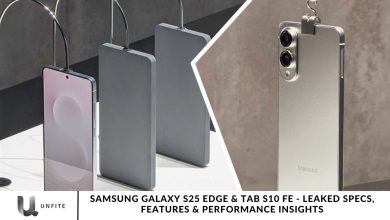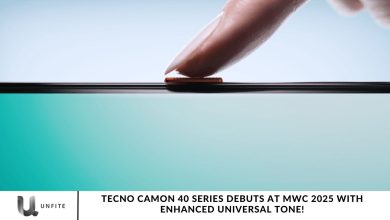Samsung Galaxy S24 Ultra – Potential Upgrade to a Titanium Frame
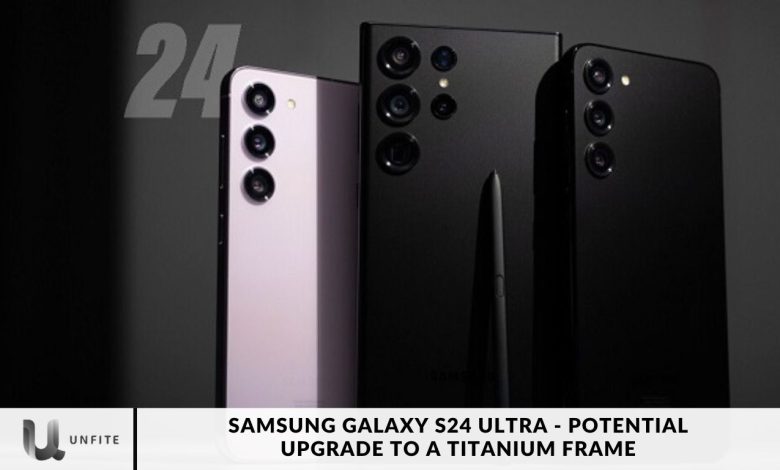
One of the most eagerly awaited lineups from Samsung is the Galaxy S24 series. As with any highly anticipated release, rumors abound. A particularly intriguing rumor centers around the design and build of the phones, specifically their bodies and frames.
Recent speculation suggests that the Samsung Galaxy S24 Ultra might feature a titanium frame. This potential upgrade has generated significant buzz, with some rumors even hinting at the possibility of titanium frames across the entire S24 series.
S24 Ultra Might Have the First Titanium Frame by Samsung
According to The Elec, rumors about the Samsung Galaxy S24 Ultra are spreading rapidly. The most notable one suggests that the phone will feature the first titanium frame in the series. The Elec, citing unidentified sources, mentions that Samsung may “expand the application depending on reception.”
Unlike the S23 Ultra, the S24 Ultra’s titanium frame is not expected to significantly affect the device’s overall weight. However, titanium is anticipated to greatly enhance the phone’s build quality. Although the titanium build of the iPhone 15 Pro Max has been a topic of debate, the material is known for its strength and durability, which could substantially improve the robustness of the Samsung S24 Ultra.
Samsung Galaxy S24 Ultra: Titanium Build Challenges
According to The Elec, rumors about the Samsung Galaxy S24 Ultra are circulating, with the most notable one suggesting the phone will feature the first titanium frame in the series. The Elec, citing unidentified sources, mentions that Samsung may “expand the application depending on reception.”
It’s important to note that, similar to the iPhone 15 Pro Max, the S24 Ultra is not expected to be made entirely of titanium but rather to incorporate it as part of a blend. Some leaks regarding Samsung’s next flagship device receiving a “Titanium” build have been questionable, so it’s crucial to manage expectations.
While titanium is present in Apple’s current flagship phone, Samsung may be considering a similar approach for their S24 Ultra to compete with the iPhone 15 Pro Max. However, producing a smartphone body with titanium presents several challenges, including increased costs. More definitive information will be available when Samsung formally announces its upcoming lineup.
Pricing and Future Possibilities
Using heavyweight materials could potentially result in a higher price tag for the Galaxy S24 Ultra. Current speculation does not extend this titanium enhancement to its sibling models—the S24 and S24 Plus—or to other Samsung devices. However, if the public reception is positive, we might see a broader roll-out of titanium in future Galaxy iterations. As cited by MacRumors, manufacturing experts warn of the challenges titanium presents in cutting and processing, including its low heat conductivity, which can impede clean cutting.
Adding to the potential structural changes are rumors of a new color palette for the S24 series. Industry insider Ice Universe suggests that the new lineup may feature seven new colors, ranging from the standard black to a vibrant orange. While official images have yet to surface, enthusiasts and digital artists at PhoneArena have created renders offering a tantalizing glimpse of what might be in store.
Amidst the whirlwind of rumors and leaks, it’s wise to maintain a healthy skepticism. The tech world is unpredictable, and last-minute changes are expected.
Samsung’s strategy is focused on combining durability with distinction. If the Galaxy S24 Ultra materializes as rumored, it could set a new standard for future designs, ushering in an era where smartphones are as robust as they are revolutionary.
The Galaxy S24 Ultra With a Titanium Frame Will Not be Lighter than the Galaxy S23 Ultra.
Samsung is reportedly in the late stages of securing the yield rate for titanium cases, working with multiple Chinese suppliers at its Vietnam plant. The company is collaborating with Chinese firm Soloman and South Korean firm KH Vatec for these titanium frames. While titanium is more robust than aluminum and lighter than steel, it is also harder to cut and finish, resulting in a lower yield rate and higher costs. Currently, Samsung uses aluminum frames for its phones, which cost less than $20 each, but titanium frames could significantly increase the Bill of Materials (BOM) and, consequently, the device’s price.
Apple’s switch from stainless steel to titanium for the iPhone 15 Pro series reduced the devices’ weight. However, since Samsung has been using aluminum, switching to titanium will make the phones stronger but not lighter. This is why the Galaxy S24 Ultra’s weight is rumored to be similar to that of the Galaxy S23 Ultra. The Galaxy S24 Ultra is also expected to feature a flat-screen instead of curved edges on the right and left sides.
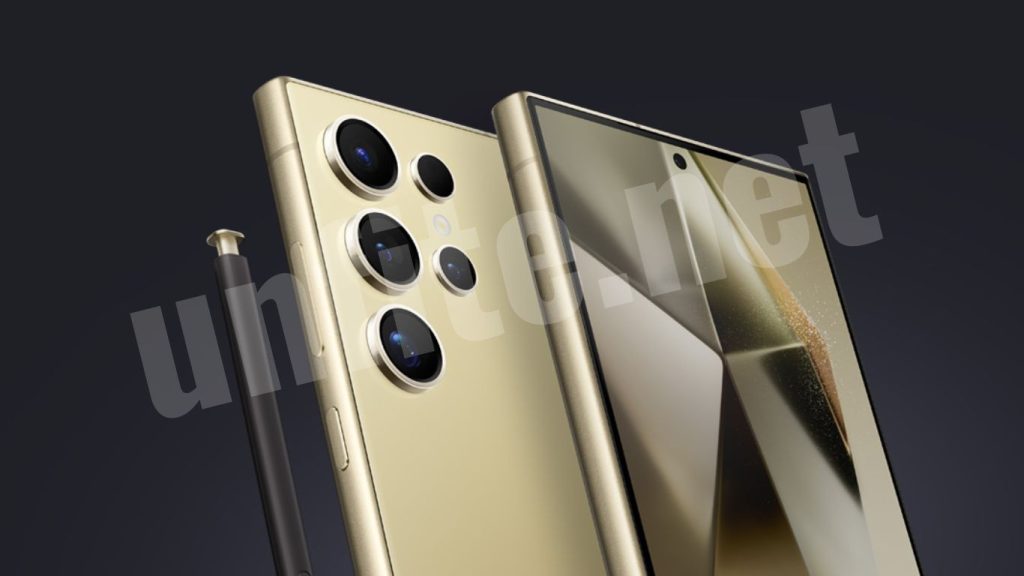
What We Know So Far
Rumors and Speculations
The buzz surrounding the Samsung Galaxy S24 Ultra suggests it may feature a titanium frame, a significant upgrade from its predecessors. Reports from reliable sources like The Elec have fueled this speculation, highlighting the potential for a more durable and robust design.
Collaborations with Suppliers
Samsung is reportedly in the late stages of securing the yield rate for titanium cases. The company works with multiple Chinese suppliers at its Vietnam plant, collaborating with Chinese firm Soloman and South Korean firm KH Vatec to develop these titanium frames. This strategic partnership indicates Samsung’s commitment to enhancing the build quality of its flagship devices.
Differentiating from Sibling Models
Current speculation does not extend the titanium frame upgrade to the Galaxy S24 and S24 Plus models. The focus remains on the Galaxy S24 Ultra, positioning it as the premium model in the series. However, if public reception is positive, there could be a broader roll-out of titanium frames in future Galaxy iterations.
Cost and Manufacturing Considerations
Titanium is more robust than aluminum and lighter than steel, but it presents significant manufacturing challenges. Its hardness makes it difficult to cut and finish, leading to a lower yield rate and higher production costs. Currently, Samsung uses aluminum frames for its phones, which cost less than $20 each. In contrast, titanium frames can be much more expensive, driving up the Bill of Materials (BOM) and potentially the device’s price.
Weight Implications
While Apple switched from stainless steel to titanium for its iPhone 15 Pro series, reducing the devices’ weight, Samsung’s switch from aluminum to titanium is expected to have a different effect. Instead, the focus is on enhancing durability. This is why the Galaxy S24 Ultra’s weight is rumored to be similar to the Galaxy S23 Ultra, despite the upgrade to a titanium frame.
Design and Aesthetics
In addition to the potential titanium frame, the Galaxy S24 Ultra is expected to feature a flat-screen, a departure from the curved edges seen in previous models. This design choice could complement the robust titanium frame, offering a sleek and modern look.
New Color Palette
Rumors also suggest a new color palette for the S24 series, with industry insider Ice Universe hinting at seven new colors, ranging from the standard black to a vibrant orange. While official images have yet to surface, enthusiasts and digital artists at PhoneArena have crafted renders providing a glimpse of what might be in store.
Benefits of a Titanium Frame
Superior Strength and Durability
Titanium is renowned for its exceptional strength, significantly surpassing that of aluminum. This enhanced durability can protect the Galaxy S24 Ultra from damage caused by drops, impacts, and everyday wear and tear. A titanium frame can ensure a longer lifespan for the device, making it more resilient in various environments.
Enhanced Build Quality
Incorporating titanium into the Galaxy S24 Ultra’s frame can significantly boost the overall build quality. The premium material offers a high-end feel, providing users with a sense of luxury and reliability. This upgrade could position the Galaxy S24 Ultra as one of the most robust smartphones on the market, appealing to consumers who prioritize durability and premium craftsmanship.
Aesthetic Appeal
Titanium’s sleek and modern appearance can elevate the aesthetic appeal of the Galaxy S24 Ultra. The material’s natural metallic finish offers a sophisticated look that attracts users seeking style and substance in their smartphones. Additionally, titanium’s ability to retain its appearance over time can help maintain the phone’s premium look even after extended use.
Competitive Edge
By adopting a titanium frame, Samsung can gain a competitive edge over other smartphone manufacturers. This move can set the Galaxy S24 Ultra apart from its competitors, including Apple’s iPhone 15 Pro series, by showcasing Samsung’s commitment to innovation and quality. Using titanium can attract tech enthusiasts and early adopters eager to experience cutting-edge materials and technology in their devices.
Potential for Future Innovations
Introducing titanium in the Galaxy S24 Ultra could pave the way for further innovations in future Samsung devices. As the company gains experience working with this material, it may discover new applications and design possibilities, leading to more advanced and durable smartphones in subsequent generations.
Market Perception and Brand Image
A titanium frame can enhance Samsung’s brand image, reinforcing its reputation as a leader in smartphone technology. By showcasing its ability to integrate high-performance materials into its products, Samsung can strengthen its market position and appeal to a broader audience seeking premium, durable devices.
Challenges of Using Titanium
Manufacturing Difficulties
Titanium is notoriously difficult to work with due to its hardness and low thermal conductivity. Cutting, shaping, and finishing titanium requires specialized equipment and techniques, which can complicate manufacturing. These challenges can lead to a lower yield rate, meaning fewer usable frames are produced from a given amount of raw material. Consequently, this can increase production time and costs.
Increased Costs
The cost of titanium is significantly higher than that of aluminum. Currently, Samsung uses aluminum frames for its phones, which cost less than $20 each. Titanium frames are much more expensive, which drives up the Bill of Materials (BOM). This increased cost will likely be passed on to consumers, resulting in a higher retail price for the Galaxy S24 Ultra. While the premium material can justify the higher price tag, it may still deter some potential buyers.
Weight Implications
While titanium is lighter than steel, it is heavier than aluminum. Samsung’s current use of aluminum frames helps keep the weight of their phones relatively low. Switching to titanium, while beneficial for strength, may not reduce the device’s weight. The Galaxy S24 Ultra’s weight is rumored to be similar to that of the Galaxy S23 Ultra, meaning users won’t experience a lighter phone despite the upgrade. Balancing the benefits of increased durability with the potential drawback of added weight is a critical consideration for Samsung.
Processing and Scalability
Scaling up the production of titanium frames to meet high consumer demand can be challenging. The intricate processing requirements and the need for precision in manufacturing make ramping up production volumes difficult without compromising quality. Samsung must ensure that it can consistently produce high-quality titanium frames at scale, which may require significant investment in new machinery and training.
Heat Management
Titanium has low thermal conductivity, which can be a drawback in smartphone design. Efficient heat dissipation is crucial for maintaining optimal performance and preventing overheating. Using titanium in the phone’s frame could potentially impact the device’s ability to manage heat effectively, leading to performance issues. Samsung needs to address this challenge by incorporating effective heat management solutions to ensure the Galaxy S24 Ultra performs reliably under various conditions.
Market Reception
While titanium can enhance the phone’s durability and aesthetic appeal, market reception remains to be determined. Consumers may need to recognize the value of the material upgrade, especially if it comes with a higher price tag. Samsung needs to effectively communicate the benefits of the titanium frame to ensure that consumers understand and appreciate the enhanced durability and premium quality.
Environmental Impact
Another consideration is the environmental impact of extracting and processing titanium. The production of titanium can have significant environmental consequences, including high energy consumption and the generation of waste. As sustainability becomes an increasingly important factor for consumers, Samsung must address these concerns by implementing environmentally responsible practices in the production of titanium frames.
Compared to the Competition
Apple’s Titanium Innovation
Apple’s decision to switch from stainless steel to titanium for the iPhone 15 Pro series highlights its commitment to enhancing device durability and reducing weight. The titanium frame in the iPhone 15 Pro models offers improved strength and a more premium feel than previous stainless steel designs. While this change has contributed to a lighter device, Apple focuses on achieving a balance between durability and weight reduction.
Samsung’s Transition from Aluminum to Titanium
Samsung’s potential switch from aluminum to titanium for the Galaxy S24 Ultra represents a different approach. While aluminum has been a staple in Samsung’s smartphone designs due to its lower cost and lighter weight, titanium promises greater strength and durability. However, unlike Apple’s approach, Samsung’s use of titanium may not significantly reduce the device’s weight. Instead, the primary benefit will be enhanced robustness and a more premium build quality.
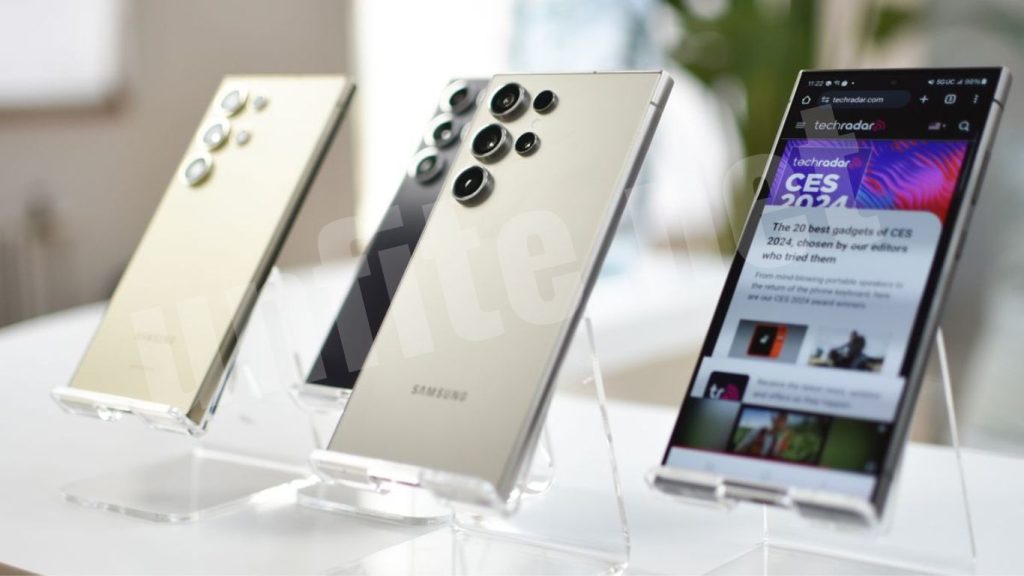
Design and Aesthetics
Apple iPhone 15 Pro Series: The titanium frame contributes to a sleek and refined look, complemented by a reduced weight. Apple has maintained a balance between durability and aesthetics, appealing to users who prioritize strength and a lightweight feel.
Samsung Galaxy S24 Ultra: If the rumors hold, the Galaxy S24 Ultra’s titanium frame will enhance durability but may not affect the weight substantially. The design will feature a flat-screen, differing from the curved edges of previous models. This shift in design could set the S24 Ultra apart from its competitors, emphasizing a robust build without the weight reduction seen in Apple’s devices.
Performance and Heat Management
Apple iPhone 15 Pro Series: Apple’s integration of titanium includes efficient heat management solutions to ensure optimal performance despite the material’s low thermal conductivity. The company has balanced durability with effective thermal regulation.
Samsung Galaxy S24 Ultra: Due to titanium’s low thermal conductivity, Samsung faces a challenge in managing heat with titanium. Effective heat dissipation will be crucial to maintaining device performance and preventing overheating. Samsung’s approach to integrating titanium must address these thermal challenges in order to compete effectively.
Market Position and Pricing
Apple iPhone 15 Pro Series: The shift to titanium has positioned Apple’s flagship models as premium devices with a corresponding higher price point. Apple has successfully communicated the value of this material upgrade to its customers.
Samsung Galaxy S24 Ultra: The potential increase in BOM due to titanium could result in a higher price for the Galaxy S24 Ultra. Samsung will need to justify this price increase by highlighting the benefits of titanium, such as increased durability and a premium feel, to ensure competitive positioning in the market.
Future Prospects
Apple: Apple’s use of titanium sets a high standard for premium smartphone design. Future iterations may continue to refine the balance between durability and weight, potentially incorporating more advanced materials and technologies.
Samsung: Samsung’s exploration of titanium for the Galaxy S24 Ultra could pave the way for broader adoption of this material in future devices. Success with the S24 Ultra may encourage Samsung to integrate titanium more widely across its product lineup, further elevating its durability and innovation reputation.
Frequently Asked Question
Will the Samsung Galaxy S24 Ultra feature a titanium frame?
Yes, there are strong rumors suggesting that the Samsung Galaxy S24 Ultra may include a titanium frame. Reports from reliable sources like The Elec indicate that Samsung is exploring this material to enhance the phone’s durability and premium feel.
How does the titanium frame affect the weight of the Galaxy S24 Ultra?
Despite the switch to titanium, the Galaxy S24 Ultra’s weight is expected to be similar to that of the Galaxy S23 Ultra. Titanium, while more robust, is heavier than aluminum but lighter than steel. Therefore, the primary benefit of the titanium frame will be increased strength rather than a significant weight reduction.
What are the benefits of using a titanium frame?
A titanium frame offers several benefits, including increased strength and durability, a premium build quality, and an enhanced aesthetic appeal. It provides better protection against damage and wear, making the device more robust and long-lasting.
What challenges are associated with using titanium in smartphones?
Titanium’s challenges include higher manufacturing costs due to its hardness, which makes cutting and finishing more difficult. Additionally, titanium has low thermal conductivity, which can impact heat management. These factors can increase production costs and potentially lead to a higher retail price for the device.
Will the Galaxy S24 Ultra’s design include a flat or curved screen?
The Galaxy S24 Ultra is expected to feature a flat-screen, moving away from the curved edges seen in previous models. This design choice complements the rumored titanium frame and offers a more modern look.
How does the Galaxy S24 Ultra’s potential titanium frame compare to the iPhone 15 Pro’s titanium frame?
The Galaxy S24 Ultra and the iPhone 15 Pro series are rumored to use titanium frames, but their approaches differ. Apple’s titanium frame aims to reduce weight while maintaining durability, whereas Samsung’s use of titanium in the S24 Ultra focuses on enhancing strength without significantly altering the device’s weight.
What impact will the titanium frame have on the price of the Galaxy S24 Ultra?
Introducing a titanium frame is expected to increase the Bill of Materials (BOM), potentially leading to a higher retail price for the Galaxy S24 Ultra. The cost of titanium is higher than aluminum, which could drive up the device’s price.
Conclusion
The potential upgrade to a titanium frame for the Samsung Galaxy S24 Ultra represents a significant shift in design and material choice, promising enhanced durability and a premium feel for one of the year’s most anticipated smartphones. While integrating titanium brings notable advantages, including superior strength and a sophisticated aesthetic, it also presents several challenges, such as increased manufacturing costs and potential impacts on heat management.
Comparatively, Samsung’s move to titanium aims to rival similar advancements seen in competitors like Apple’s iPhone 15 Pro series. Although titanium may not drastically reduce the Galaxy S24 Ultra’s weight, its strength and durability could position the device as a standout in the high-end smartphone market. The shift from aluminum to titanium could set a new standard for future Samsung devices, reflecting the company’s commitment to innovation and quality.

